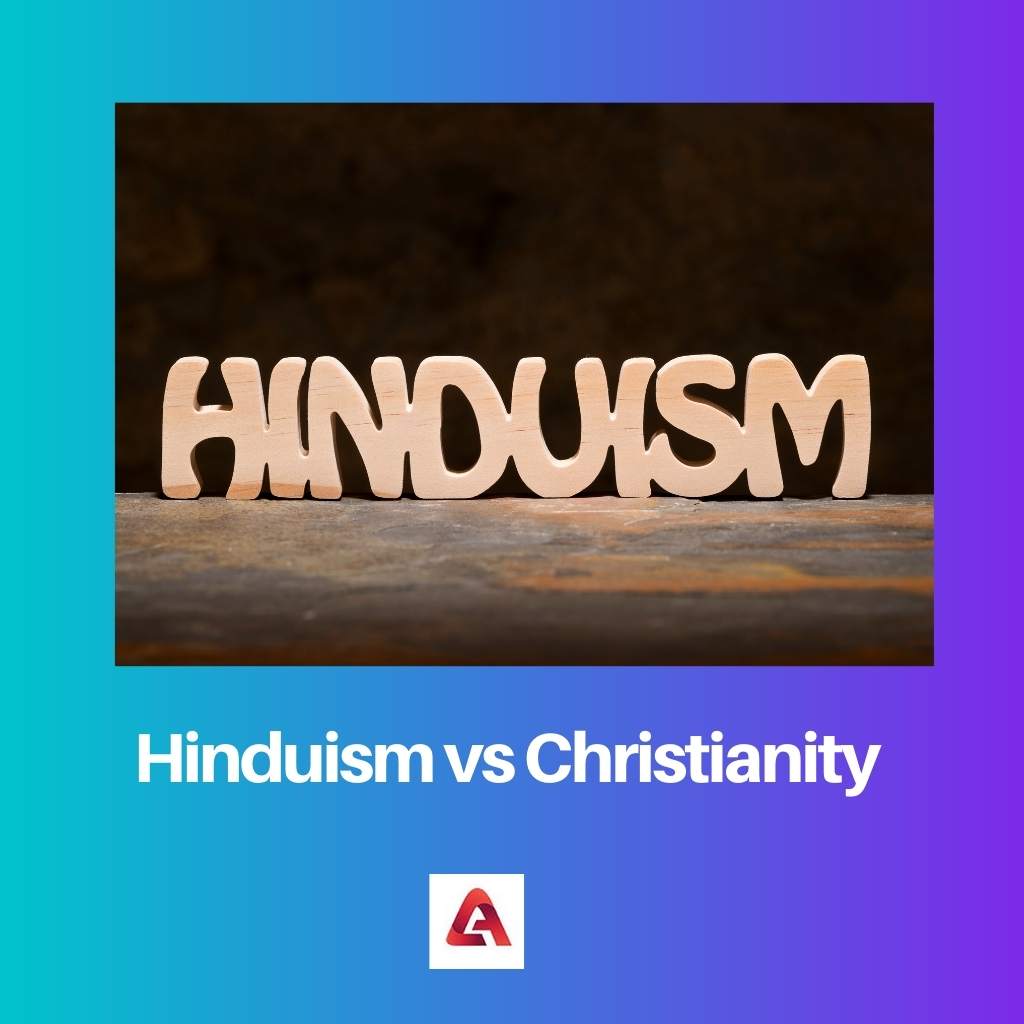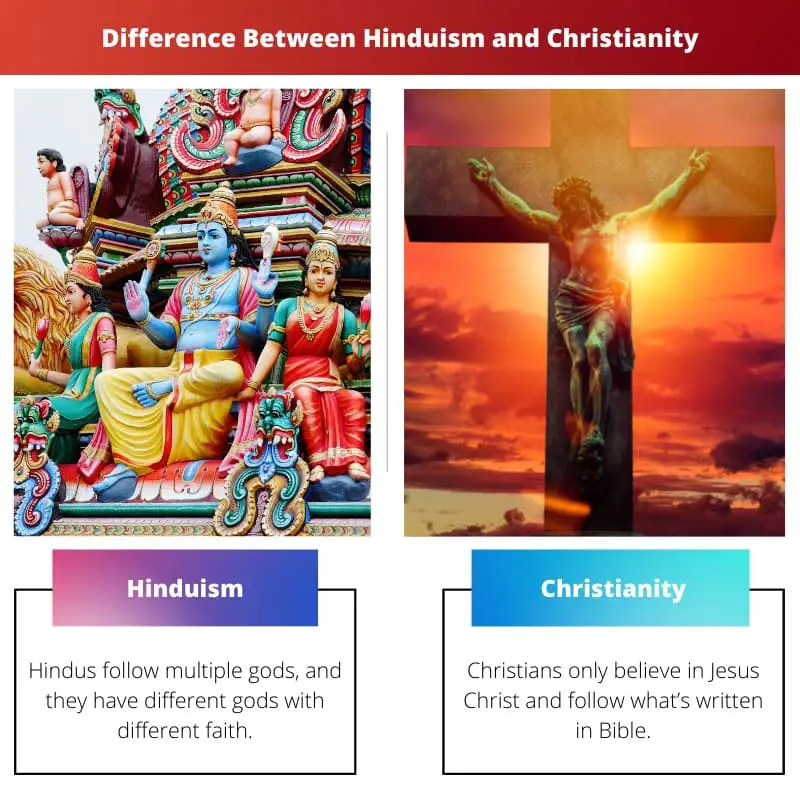There are so many religions in this world, and people have different beliefs. Different countries follow different religions with different customs and rules.
But still, there is peace and harmony because no religion teaches cruelty and violence. And because of religion, there is honesty and calmness inside a human.
Christianity is the oldest religion followed by people worldwide. It is one of the topmost followed religions in the world and has so many divisions. And Hinduism is also one of the oldest religions.
It comes in the top three most followed religions in the world. Both of the regions have their leaders or religious teachers.
Key Takeaways
- Hinduism and Christianity are two major religions in the world.
- Christianity is monotheistic, believing in one God, while Hinduism is polytheistic, with many gods and goddesses.
- In Hinduism, the ultimate goal is to achieve moksha (liberation from the cycle of rebirth), while in Christianity, it is to attain salvation through faith in Jesus Christ.
Hinduism vs Christianity
The difference between Hinduism and Christianity is that Hinduism believes in many gods and has many holy scriptures with different teachings. And Christianity only believes in Jesus Christ, and they only follow the Holy Bible, which is the only sacred book of Christians.

Hinduism is among the oldest religions in the world, with around 90 crores of believers or followers worldwide, making it the third-largest religion in the world. The people who follow Hinduism are called Hindus. They believe in so many gods and have lots of holy scriptures.
Christianity ranked first among the most followed religion in the world. And have around 2.1 billion followers around the world. They only believe in Jesus Christ and one god concept. Bible is the only holy scripture they follow, and they believe that only Bible can save them from their sins.
Comparison Table
| Parameters of Comparison | Hinduism | Christianity |
|---|---|---|
| Believe | Hindus follow multiple gods, and they have different gods with different faith. | Christians only believe in Jesus Christ and follow what’s written in Bible. |
| Holy books | Hinduism has lots of religious books like Vedas, Bhagwat Geeta, and Brahmanas, etc. | Christians only follow Bible, and Bible is the most important sacred text for them. |
| Religious place | For praying and doing religious activities, Hindus have their temples as their religious place. | Christians have churches where they do gathering and their other religious activities. |
| Religious teachers | Hinduism has Hindu priest or pandit who teaches things related to their holy books. | Christians have Pope or father in their churches, and they teach about their religion. |
| Afterlife concept | There is an afterlife concept in Hinduism, and they believe in it. | There is no afterlife concept in Christianity, and they don’t believe in it. |
| God | Hinduism follows polytheism which means they follow or believe in different gods. | Christians follow theism which means they only follow one god. |
| Salvation | Hinduism believes that all path leads to god and redemption no matter what religion is followed by the person. | Christians only believe in Bible, and they believe that only Bible leads to god and redemption. |
What is Hinduism?
Hinduism is a religion with rich culture and traditions. It is divided into many cast and creeds, but all follow the same religious scriptures. Almost 900 million people follow Hinduism or accept Hinduism as their only religion. It is one of the oldest religions in the world.
Hinduism follows the concept of rebirth and the afterlife, which means they believe that people are reborn after death and are given appearances according to their sins. They also believe that all paths reach absolution regardless of religion.
Mostly Hinduism culture is followed in Asian countries. They have their temples where they do prayers and other holy activities according to their scriptures. The followers of Hinduism accept the thought of Christianity and believe that all paths can lead to god.

What is Christianity?
Christianity is the most popular religion, ranked first in the world with around 2.1 billion followers. There are many types of Christians, like Protestants, Catholics, etc., but all believe in the Holy Bible and Jesus Christ. They also believe that only the Holy bible leads to redemption.
Christians do not believe in the afterlife concept; instead, they believe that there is only one life, and after death, all people will face God, and God will give place to them according to their sins. Holy Bible is the only scripture they follow, and they do things accordingly to what is written in it.
The church is where Christians do all their religious activities like praying, gatherings, etc. And according to them, Christianity is the true religion to be followed.

Main Differences Between Hinduism and Christianity
- Hindus follow multiple gods, and they have different gods with a different faith. While Christians only believe in Jesus Christ.
- Hinduism is followed by 900 million people worldwide, making it the third most popular religion in the world. While Christianity is followed by 2.1 billion people worldwide, ranking it first among the most popular religions.
- Christians only believe in Bible, and they believe that only Bible leads to god and redemption. In contrast, Hinduism believes that all paths lead to god and redemption, regardless of the person’s religion.
- Hindus have their temples as their religious place for praying and doing other religious activities, and Christians have churches where they do gathering and their other religious activities.
- Christians have Pope, father, and priests in their churches. They teach about their religion and do the rituals as commanded by God in their Holy Bible. Whereas Hinduism has a Hindu priest or pandit who teaches things related to their holy books.

- https://books.google.com/books?hl=en&lr=&id=KpIWhKnYmF0C&oi=fnd&pg=PR10&dq=hinduism&ots=5LLvZOJwrW&sig=qBBaQy6WqpFKvaiy9pNvQ_BrDnM
- https://books.google.com/books?hl=en&lr=&id=e4XMZjLAUv8C&oi=fnd&pg=PT8&dq=christianity&ots=en07Wl6LQc&sig=ff53uuzK5RIIclt7-IksL_u5cfg

The key takeaways of this article highlight the fundamental differences between Hinduism and Christianity, making it easier to understand their core principles.
Yes, the comparison table is particularly helpful in illustrating the distinctions between the two religions.
The explanations on the beliefs, holy books, religious places, and afterlife concepts of Hinduism and Christianity are very enlightening.
Agreed, this article provides a clear understanding of the major differences between the two religions.
The comparison of the religious teachers, concept of god, and salvation in Hinduism and Christianity is quite insightful.
The comparison between Hinduism and Christianity regarding their beliefs, religious practices, and concepts of salvation is both insightful and thought-provoking.
The explanations on the concept of salvation and the afterlife in Hinduism and Christianity are well-articulated, offering a comprehensive understanding of their divergent ideologies.
Indeed, the article provides a compelling analysis of the differences between these two prominent religions.
The detailed insights into the rich culture, traditions, and beliefs of Hinduism presented in this article offer a profound understanding of this ancient religion.
Absolutely, the article provides a well-rounded depiction of Hinduism’s cultural and religious significance.
The in-depth exploration of Christianity’s core beliefs, scripture, and afterlife concept in this article is highly insightful and thought-provoking.
I agree, the article offers a comprehensive understanding of the fundamental principles and ideologies of Christianity.
The comprehensive comparison table effectively showcases the contrasting aspects of Hinduism and Christianity, making it easier to grasp their disparities.
This article offers a well-structured overview of both Hinduism and Christianity, presenting their core beliefs and practices in a comprehensive manner.
The detailed explanation of Hinduism’s rich culture, traditions, and beliefs in this article is quite informative and engaging.
Absolutely, the article effectively captures the essence of Hinduism’s religious and cultural significance.
This article provides a detailed comparison between Hinduism and Christianity, shedding light on their beliefs, scriptures, and religious practices.
I agree, the information provided here is quite comprehensive and well-explained.
The thorough description of Christianity’s core beliefs, scripture, and afterlife concept in this article is highly educational and valuable.
I completely agree, the content provides an in-depth understanding of the principles and teachings of Christianity.